Pastor, professional baseball player, heart attack survivor. Gil Barrow has experienced many things in his life, but he never thought the latter would be a part of his story.
Barrow, now retired, played two years for the Brooklyn Dodgers organization in the minor leagues before hanging up his cleats to attend New Orleans Baptist Theological Seminary and spend a career as a pastor.
In October 2016, the Montgomery resident experienced shortness of breath and a rapid heartbeat while lounging in his chair at home.
“I was feeling rather strange,” Barrow said. “I told my wife, ‘Honey, we better get somewhere. Something is happening.’”
Barrow and his wife, Barbara, went to their local physician and determined he was in the middle of a heart attack.
A Southern Baptist preacher for more than 40 years, Barrow, 79, says he never was afraid.
“There was uncertainty as to what was going on; but when the doctor told me I needed to go to the ER, I started thinking like most men would,” he said. “I thought, ‘Well if this is it, Lord, I’m ready to go. I’m not in a hurry, but I’m ready.’”
 Barbara and Gil BarrowAfter treating him in Montgomery, staff there determined Barrow should consider having a TAVR procedure. Barrow reached out to John Porterfield, M.D., a gastrointestinal surgeon at the University of Alabama at Birmingham Hospital, for whom Barrow had been a father-figure since Porterfield was a child.
Barbara and Gil BarrowAfter treating him in Montgomery, staff there determined Barrow should consider having a TAVR procedure. Barrow reached out to John Porterfield, M.D., a gastrointestinal surgeon at the University of Alabama at Birmingham Hospital, for whom Barrow had been a father-figure since Porterfield was a child.
“Dr. Porterfield told me that he knew the doctor who did the TAVR procedure,” Barrow said, “and that there was nobody better than Dr. Davies.”
James E. Davies, Jr., M.D., chief of the UAB Section of Adult Cardiac Surgery, met with the Barrows and explained the TAVR procedure.
The technology available at UAB for surgeons to perform a TAVR procedure is among the most advanced in the Southeast. In a hybrid operating room with both surgical and X-ray capabilities, a multidisciplinary team places a guidewire through the malfunctioning valve, either from the groin or through a small incision between the ribs in the chest. The new valve is compressed on a flexible catheter. With imaging guidance, it is positioned inside the malfunctioning valve, then expanded to replace the malfunctioning valve.
In only four years of performing the procedure, UAB is the only hospital in Alabama that has been able to do 500 TAVR cases. Davies credits his staff and the resources UAB is able to provide in changing so many lives.
“We started the TAVR program in 2012 and had a big team to help us, and since that time we have done a little more than 500 cases,” Davies said. “This has allowed us to provide care for a group of people that we probably wouldn’t have been able to provide care for.”
TAVR provides a low-risk alternative to open-heart surgery with a much shorter recovery time. Many patients return home in less than a week.
As a pastor, Barrow had seen many of his church members in the hospital and knew the toll that heart surgery can take on a person.
After the TAVR device was successfully placed, Barrow says he could not believe how much better he felt immediately after the procedure. “I felt so good,” he said. “I wanted to get up and walk around.”
Barrow and his wife, Barbara, married for 57 years, say that family is very important to them, and that having this TAVR procedure gives him new opportunities to spend time with his three children and eight grandchildren.
“Before, I wouldn’t want to travel to family gatherings as much because I didn’t want to be a burden on everyone,” he said. “Now I can’t wait to see everyone at Christmas.”
Barbara Barrow is happy that she will have her entire family together, because she says their family has been so supportive through the entire process.
“It’s always so wonderful to have everyone together,” she said. “Our son has been with us the whole time, and our two daughters who live in different states were able to come back for the procedure date. We’re just so blessed."
Barrow has since retired from preaching full time; but because of his new opportunities in both health and retirement, he has spread the word about TAVR and the doctors at UAB who helped him get back on the right track.
“I’ve spoken to prayer groups, churches, anybody I can, and I tell them ‘Go to Birmingham. Go see Dr. Davies,’” Barrow said.
While the science may be difficult to understand, the outcome is not.
“I cannot understand how the doctors do it, but it is making a tremendous difference in people’s lives,” Barbara Barrow said.